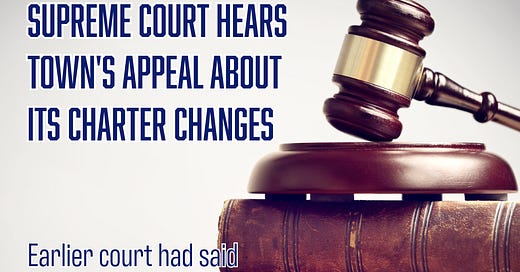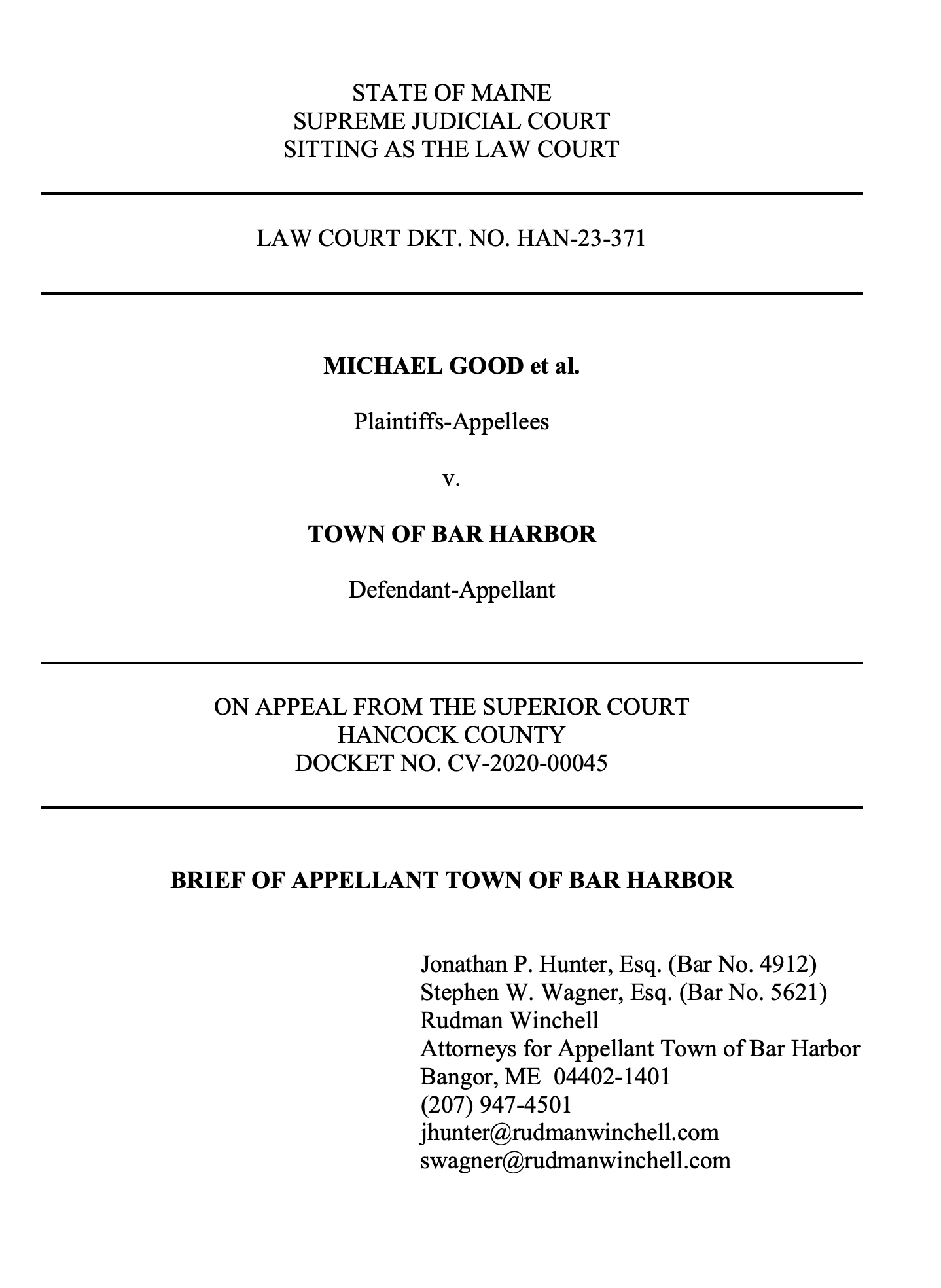Supreme Court Hears Town's Appeal Concerning Charter Changes
Earlier court had said changes should be "set aside"
BAR HARBOR—The Maine Supreme Judicial Court heard Bar Harbor’s appeal in a court case concerning whether or not changes to the town’s charter abide by Maine’s Home Rule Act, May 7.
Hancock County Superior Court Justice William Anderson ruled on October 24, 2022 that the 2020 changes to the town’s charter were “not appropriate” and “should be set aside.”
Though the court initially said it would have oral arguments, Anderson had decided not to “after conducting a thorough review of the issues raised and upon further reflection.” Instead, the court decided without hearing discussion or argument.
The town disagreed with Anderson’s decision and appealed to the Maine Supreme Court. Arguments were heard today, May 7.
The case involves the modification of Bar Harbor’s charter. A charter is the town’s legal document that does multiple things including establishing a town or city as a municipality, determining how it is organized, what form of government it uses, financial matters, and other procedures.
Voters adopted eight of nine suggested changes to Bar Harbor’s charter in November 2020.
Several Bar Harbor voters brought the case to court, led by Michael Good, former Warrant Committee member, challenging the legality of the changes.
In November 2018, the town created a commission to change the town’s charter. Commissions are typically used for substantive changes.
That commission came up with nine changes, which the town has called “modifications,” and according to the brief presented by Good’s attorney, “which it indicated created ‘changes to 19 areas within the current structure of the charter’ and constituted a ‘vision for the future of (the town’s) governance.’”
The town has argued that the changes do not substantively change the charter.
In a brief, the town has also argued that the plaintiffs did not “show any deficiency that process, much less one that ‘materially and substantially’ affected the charter modifications.” Bar Harbor believes that the Superior Court made an error ruling against the town.
Anderson had found that “as a matter of law, the Town of Bar Harbor did not follow the proper procedures when enacting the changes, that the use of improper procedures materially and substantially affected the changes, and the changes should be invalidated.”
What exactly were those changes?
Those changes impact multiple areas of the town’s charter including the composition and election of the Warrant Committee.
The changes were to:
The town Warrant Committee’s duties;
Use of electronic voting at town meetings;
The land use ordinance;
Town’s School Committee structure;
Town manager and/or planning director duties;
Salaries of certain town officials;
Town budget development process;
Warrant Committee structure;
Filing deadlines for nominating petitions; and,
The initiative and referendum process.
In its judgement, the Superior Court invalidated the changes to the town’s charter. The town has continued operating as if those changes are valid.
Attorney for Bar Harbor Jonathan P. Hunter said Tuesday morning, “The charter has been in effect for over three years with the changes.”
The implications of this if the Supreme Court upholds the Superior Court’s decisions have not been publicly discussed.
HOME RULE ACT
The plaintiffs had argued that the changes were “improperly presented to the voters” and therefore violated Maine’s Home Rule Act. This, they said, “materially and substantially affected what changes were ultimately made” to the town’s charter. Anderson’s court agreed and said that those eight, voter-approved changes “should indeed be invalidated.”
“There are many towns in Maine who have done the exact same thing that Bar Harbor did,” former town manager Kevin Sutherland had said in 2022. Those changes occurred before his tenure.
The Home Rule Act allows charters to be changed and details the procedures to do so. Part of what is being argued is whether or not how the changes were presented to the voters was allowed by the Home Rule Act.
The town has argued in its appeal that the Superior Court “abused its discretion by failing to order resubmission to the voters at all, despite recognizing its authority to do so.’” The brief from the town, written by Jonathan P. Hunter and Stephen W. Wagner, of Rudman Winchell, reads.
The argument is that the town didn’t comply with state law and its own charter when it elected the Charter Commission members in November 2018, that it didn’t comply with Home Rule Act when it changed the questions after the commission had stopped working, and that the charter changes were placed on an inappropriate ballot (November 2020 rather than June 2020), and that presenting the changes individually rather than as a whole “constituted a ‘revision’—not mere ‘minor modification.’”
The brief written by Maxwell Coolidge for Good and the other plaintiffs states, “The heart of the issue is whether the proposed changes–which were presented to the voters as nine separate ballot questions–were required to be presented as a single up or down vote. The Home Rule Act clearly and plainly requires that charter revisions of this type be presented as a single ballot question. The town did not have the authority to do what it did by splitting the proposed changes into separate questions.”
A brief by the Maine Municipal Association supports the town’s arguments.
Requiring the Charter Commission to present a coherent whole would avoid inconsistencies, Coolidge told the Supreme Court justices, Tuesday morning.
BACKGROUND
The voters had created a Charter Commission in November 2018. That commission’s purpose was to revise the town’s charter.
One of the contentions in the case is whether the changes should have been proposed as a whole or as individual changes. The Commission ended up presenting the changes as nine different modifications.
As detailed above, Good and others argued that the changes should have been presented as one article on the warrant rather than nine.
The Home Rule Act has different processes for charter amendments and charter revisions, Hunter said Tuesday morning during Maine Supreme Court arguments. The changes didn’t broadly rewrite the charter, he said, but changed the structure. The errors were not substantial or material, Hunter argued. He requested that the court vacate the decision. To vacate a judgement means to void it.
During the process of the warrant’s approval, there was an error related to language transposition. The town clerk and Council and Warrant Committee were made aware. While it can be described many ways, a warrant is both a notice to the voters that the town is conducting business they should attend to, a warning that a meeting they might not want to miss is occurring and a listing of issues that will be voted on.
Voters passed eight of the nine changes. They did not approve changing the Warrant Committee’s responsibilities. Voters did, however, change the committee structure so that individual members were elected rather than a slate of representatives. It also decreased the number of committee members.
LINKS TO LEARN MORE
https://barharborstory.com/2022/12/08/town-asks-superior-court-to-reconsider-decision/
2020 Charter Commission Report
Judge Rules 2020 Changes to Bar Harbor’s Town Charter Should Be Set Aside
https://www.courts.maine.gov/courts/sjc/calendar.html?utm_source=substack&utm_medium=email
If you’d like to donate to help support us, you can, but no pressure! Just click here.







When all is said and done and all the expenses incurred on the taxpayers is tallied these are wise and healthy changes to Bar Harbors charter.
Some folks can’t see the forest through the trees…..